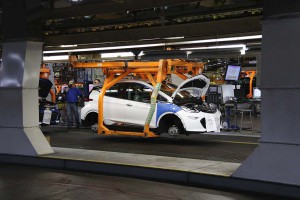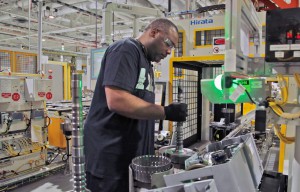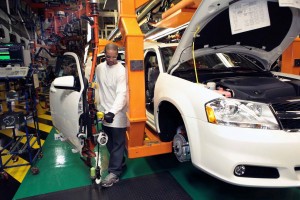FCA US, Ford, and General Motors produce more of their vehicles, buy more of their parts, and conduct more of their R&D in the U.S. than their competitors, according to a new report from the American Automotive Policy Council Inc.
“As a result, they employ nearly two out of three of America’s autoworkers and operate three out of five of America’s auto assembly plants,” the report’s executive summary stated. “Automakers and their suppliers are America’s largest manufacturing sector, responsible for 3% of America’s GDP or gross domestic product.”
No other manufacturing sector generates as many American jobs, the report by the Washington, D.C. association that represents the common public policy interests of domestic carmakers added.
The report, released this week, also noted that FCA, Ford and General Motors each invest more in research and development than Hewlett-Packard, Facebook, Boeing and ExxonMobil. The three automakers invest more than $18 billion in R&D, combined, each year, according to the report, which was prepared for AAPC by the Center for Automotive Research in Ann Arbor, Michigan.
(U.S. new vehicle sales rebound in September. For the story, Click Here.)
“To appreciate the scale and significance of auto R&D, consider several findings from CAR’s recent report, ‘Just How High-Tech is the Automotive Industry?’ For example: a new smart phone contains one microprocessor, while a new car or truck contains about 60,” the report said.
“These microprocessors manage 100 or more sensors located throughout the vehicle, connected by as much as a mile of wiring. Just as important, a microprocessor in a smart phone is expected to last about three years, while autos are expected to last 12 years or more.”
Overall, the auto sector ranks third out of the forty largest industries, on a global basis, in R&D spending.
Because the auto industry is so big, the difference between domestic automakers’ 83% sales-weighted U.S. production rate and their competitors’ 63% sales-weighted U.S. production rate represents hundreds of thousands of jobs and billions in capital investment.
(Renault-Nissan’s Ghosn raises caution flag for U.S. auto market. Click Here for the story.)
In order to match the sales-weighted U.S. production rate of FCA US, Ford and GM last year, foreign automakers would have needed to assemble more than 2.2 million more vehicles here.
To build 2.2 million more vehicles, foreign automakers would have to build eight plants, each employing approximately 3,000 U.S. workers and supporting tens of thousands additional U.S. jobs.
“To appreciate the scale of this difference in domestic content, consider what would happen if foreign automakers matched (domestic makers’) record. FCA US, Ford and GMs’ fleets contain 53% domestic content (on a sales-weighted basis),” the report said.

GM and its domestic rivals are one of the big drivers of the U.S. economy, according to a new report.
“Using this same calculation, foreign automaker fleets contain only 35% domestic content. If foreign automakers increased their use of domestic content to match FCA US, Ford, and General Motors’ content rate (from 35 to 53%), they would need to insource the equivalent of more than 1.5 million cars’-worth-of-parts.”
Domestic carmakers are also America’s largest exporters. During the past five years, automakers have exported more than $690 billion in vehicles and parts – approximately $76 billion more than the next largest exporter – the U.S. aerospace industry.
(To see more about Ford’s new $100K pickup, Click Here.)
AAPC report appears just as domestic carmakers are trying to deflect the Trump administration’s efforts to change key elements of the North American Free Trade Agreement. The Trump administration has proposed increasing the domestic content of vehicles sold in the U.S. if they are made in Mexico or Canada. The three domestic carmakers are opposed to the change.


